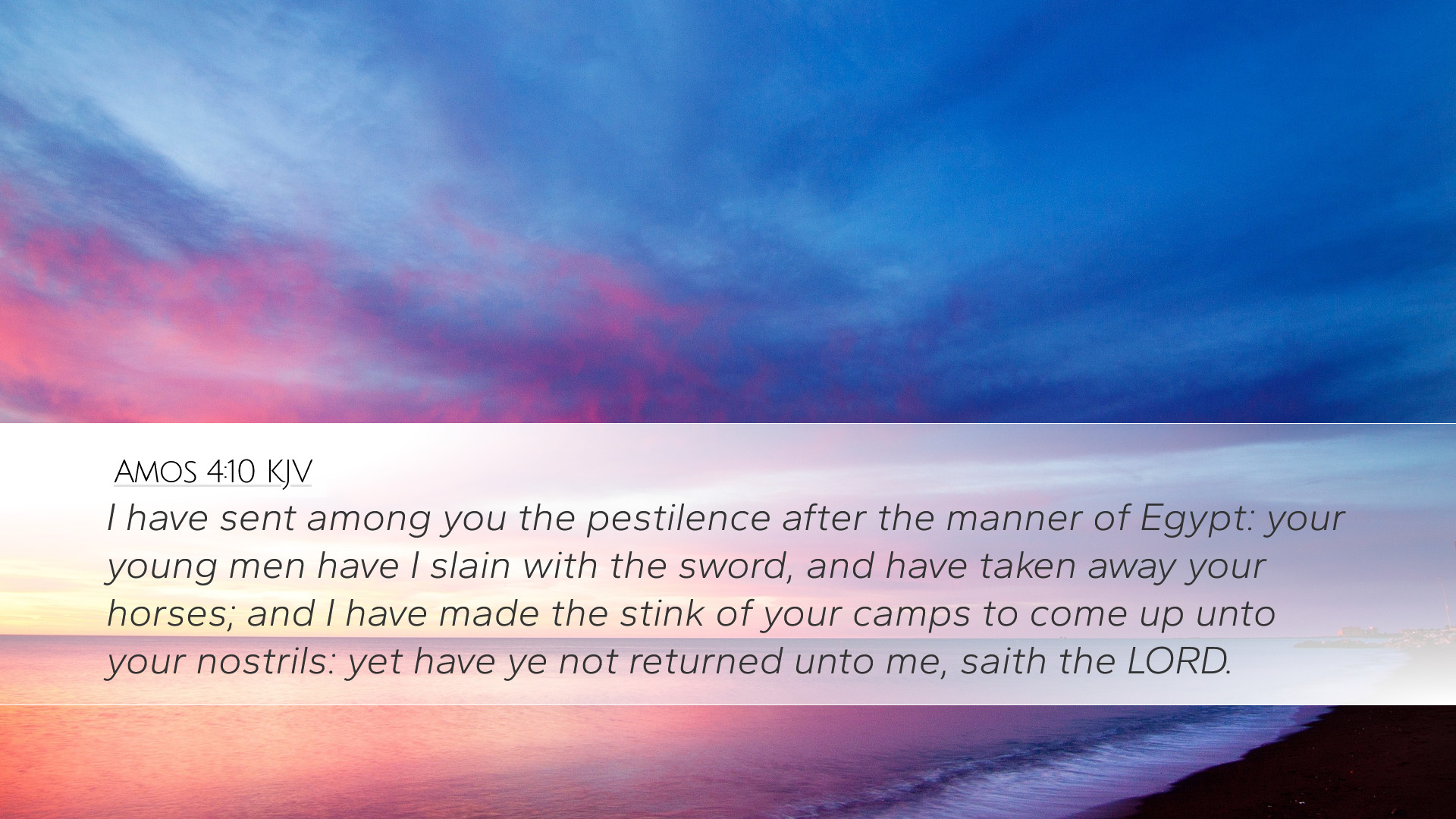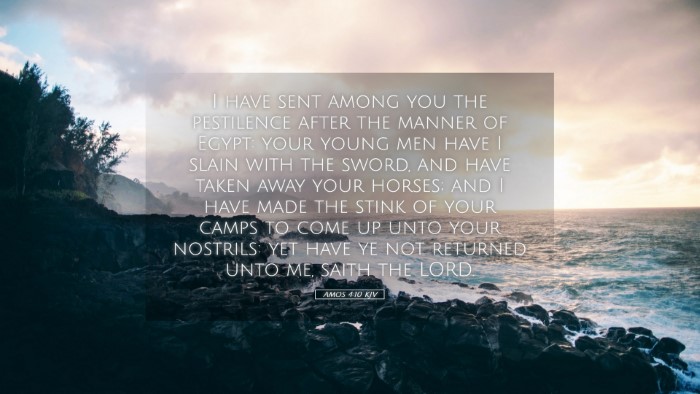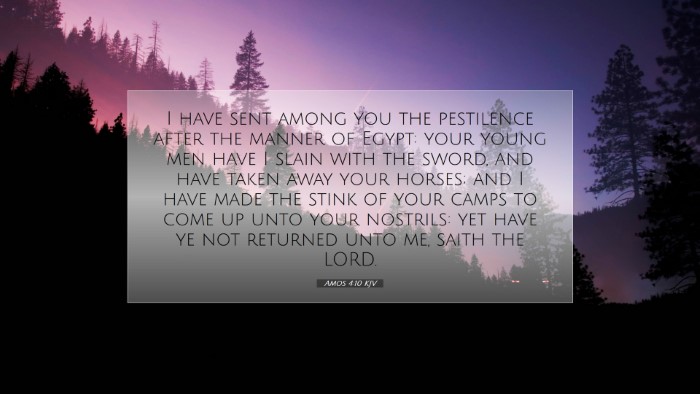Old Testament
Genesis Exodus Leviticus Numbers Deuteronomy Joshua Judges Ruth 1 Samuel 2 Samuel 1 Kings 2 Kings 1 Chronicles 2 Chronicles Ezra Nehemiah Esther Job Psalms Proverbs Ecclesiastes Song of Solomon Isaiah Jeremiah Lamentations Ezekiel Daniel Hosea Joel Amos Obadiah Jonah Micah Nahum Habakkuk Zephaniah Haggai Zechariah MalachiAmos 4:10
Amos 4:10 KJV
I have sent among you the pestilence after the manner of Egypt: your young men have I slain with the sword, and have taken away your horses; and I have made the stink of your camps to come up unto your nostrils: yet have ye not returned unto me, saith the LORD.
Amos 4:10 Bible Commentary
Amos 4:10 - A Commentary
Amos 4:10 is a profound verse that encapsulates the prophetic ministry of Amos and the dire warning he provides to the people of Israel. The verse reads: "I sent among you a pestilence after the manner of Egypt: your young men have I slain with the sword, and have taken away your horses; and I made the stink of your camps to come up unto your nostrils: yet have ye not returned unto me, saith the Lord." This scripture serves as a reminder of God’s judgment and the call to repentance amidst calamity.
Contextual Background
To fully appreciate Amos 4:10, one must consider the historical and theological context of the Book of Amos. Amos prophesied in the Northern Kingdom of Israel during a period of prosperity and social injustice. The people were indulgent and complacent, ignoring the covenantal stipulations laid out in the Law of Moses.
The Prophetic Voice
Amos, a shepherd and a fig tree farmer, was called to deliver God’s message of impending judgment. His oracles are characterized by vivid imagery and a strong moral and ethical stance against the injustices he witnessed. As Matthew Henry elaborates, Amos’s prophecies were not merely a condemnation of Israel’s political state but a profound reflection on their spiritual apathy.
Exegesis of Amos 4:10
Amos 4:10 serves as a striking summary of the judgments God inflicted upon Israel due to their transgressions. Each phrase in the verse conveys a form of divine intervention meant to elicit repentance.
"I sent among you a pestilence after the manner of Egypt."
Here, the reference to pestilence indicates a direct act of God—analogous to the plagues of Egypt. Albert Barnes notes that by invoking this imagery, Amos calls on the collective memory of Israel regarding their deliverance from slavery. The pestilence serves as an analogous form of oppression, reflecting their departure from faithful living.
"Your young men have I slain with the sword."
The mention of slain young men highlights the gravitas of divine retribution. Adam Clarke emphasizes the loss of vigor and potential in the community due to violence and conflict, suggesting that such losses should prompt reflection on the consequences of their actions.
"I have taken away your horses."
This would resonate deeply with an agrarian society where horses signified wealth and military power. The removal of horses can be seen as a stripping away of security and strength, a tangible consequence of their sinful state. Henry points out that it illustrates God's authority over the might of Israel, demonstrating that no human resource can save them from divine judgment.
"I made the stink of your camps to come up unto your nostrils."
The grotesque imagery of foul odors from camps represents the moral decay within Israel. This sensory detail emphasizes the repugnance of their sins and the inevitability of judgment. Clarke suggests that this metaphor delivers a powerful message about the reality of sin—it repulses God and ultimately leads to destruction.
The Purpose of Divine Judgments
Amos 4:10 cannot be understood without addressing the explicit purpose of these calamities. The verse concludes with the poignant phrase: "Yet have ye not returned unto me, saith the Lord." This plea from God highlights the ultimate intention behind His judgments—repentance.
The Call to Repentance
The repetitive nature of ‘returning’ signifies that God’s heart yearns for reconciliation despite the people’s rebellion. As illustrated throughout the teachings of the prophetic literature, divine discipline is always accompanied by an invitation to repentance. Barnes denotes that God’s patience and mercy remain available even in the face of persistent unfaithfulness.
Application for Today
The themes present in Amos 4:10 resonate powerfully with today’s readers, especially among pastors and theologians. The passage compels believers to reflect on their own lives, societal injustices, and the spiritual health of their communities.
- God's Sovereignty: Recognizing God’s sovereign authority over all events, both calamities and blessings, invites humility and reverent obedience.
- The Danger of Complacency: The verse warns against spiritual complacency, reminding us that blessings can lead to a false sense of security, distancing us from God's requirements.
- The Urgency of Repentance: Just as Israel was called to return, modern readers are challenged to constantly evaluate their spiritual state in response to God’s voice and actions.
- Social Responsibility: The injustices that Amos spoke against are not irrelevant today; Christians are called to uphold justice and righteousness in their communities.
Conclusion
Amos 4:10 serves as a sober reminder of God's desire for his people to live in accordance with His will. The vivid imagery and powerful message contained within this verse transcend time, inviting each generation to a place of self-examination and earnest repentance. Just as God called the people of Israel to return, He remains ever faithful in calling us to a deeper relationship with Him.


